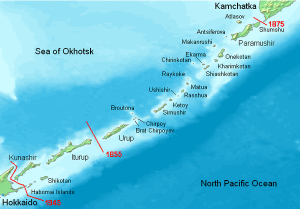Talks, Territory, and Turmoil: Japanese and Russian Foreign Ministers Meet in Moscow

This past April, Shinzo Abe became the first Japanese Prime Minister to visit Moscow in over ten years, and plans are currently underway to arrange a formal visit for Putin in Tokyo. Despite the seemingly promising tone of these most recent interactions, one fiercely contested issue, the sovereignty of the Southern Kurils/Northern Territories, will determine the success of the resolution in the future.
Since the end of World War II, this contentious issue has continuously plagued Russo-Japanese relations. The disputed Southern Kurils/Northern Territories, consisting of Etorofu, Kunashiri, Shikotan, and Habomai islets, lie between Russia’s Kamchatka Peninsula and Japan’s northernmost island of Hokkaido. The Soviet Union acquired the islands as part of the allied victors’ spoils when Japan surrendered on September 2, 1945. However in 1956, both states convened to forge a resolution to the war and its aftermath. Under the 1956 Soviet-Japanese Declaration, the Soviet Union agreed to return Shikotan and Habomai after the completion of a successful agreement to a peace deal however such a deal has continue to elude both states.
Recently, diplomatic relations between the states have become strained as Japan supported the U.S.-led initiative to impose crippling economic sanctions against Russia after its unilateral annexation of the formerly sovereign Crimean Peninsula in Ukraine. In an apparent retaliatory move, former President and current Prime Minister Dmitry Medvedev visited the disputed island of Etorofu and declared Russia’s intentions to fortify the islands as part of a broad regional security initiative. As a result of this hostile move, the U.S. State Department expressed grave concerns with Japan’s enthusiasm to engage with Russia in such a critical matter of security.
Despite the U.S.’s reservations about the matter, it appears the Abe administration is resolute on finally agreeing to a World War II peace deal and securing the return of the islands. The islands are especially salient to Abe, as he and the ruling Liberal Democratic Party (LDP) recently secured the passage of a bill allowing Japan’s Self-Defense Forces to utilize military force to defend other allied nations from attack in domestic and foreign theaters. Abe’s ardent desire for reasserting Japan’s role in the regional security architecture of East Asia does possess merit as China and Russia are steadily increasing their military alliance framework. Sino-Russo joint naval exercises in the Sea of Okhotsk, exports of S-400 air defense systems, and China’s aggressive island building in the South China Sea have put Japan on high alert in recent years. In the absence of a decisive and punitive U.S. policy for addressing China, Japan finds itself in an extremely precarious and hostile situation as China refuses to back down on the Senakaku/Diaoyu Islands dispute.
Securing the Kuril Islands and a peace deal would not only diffuse long standing regional tension but erode China’s monopoly on Russia’s military cooperation in East Asia. Furthermore, recovering the disputed Northern Territories would clearly convey Japan’s staunch determination to fight for its disputed territory in the region. Thus, securing these islands is critical to Abe to ensure that the regional security balance does not tilt in China’s favor at the expense of Japan’s.
